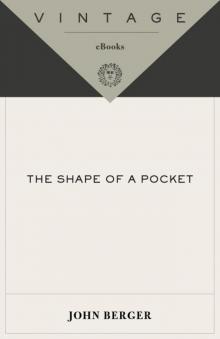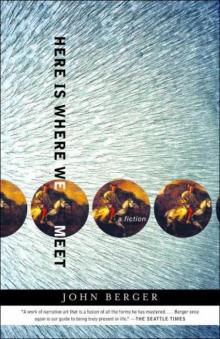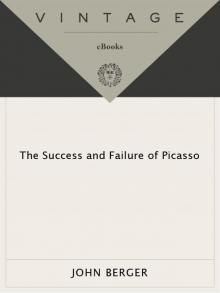- Home
- John Berger
Here Is Where We Meet Page 4
Here Is Where We Meet Read online
Page 4
I hear her say this, yet I can’t see her. I am sitting alone.
How do they go to consult him, your friends?
His surgery hours are when he’s asleep.
Dr Martins died a century ago.
The dead are allowed to sleep too, aren’t they?
What do they complain of, your friends who consult him?
Many suffer from hopefulness. Amongst us hopefulness is almost as common as depression among the living.
You see hopefulness as an illness?
One of its terminal symptoms is a desire to intervene again in life, and for us that is fatal.
Is there a cure?
Dr Martins prescribes a spell with the martyrs!
It seems he loved women, I tell her.
I’ll tell you a story, she says. One day a rich patient asked him to visit her in her large house. He examined her and then asked the maid to fetch him a glass of water from, specifically, the pantry tap. He knew the pantry was far away. During the maid’s absence he performed the cure. When the maid returned with the glass of water, he drank it. Doctor, when will your next visit be? asked the woman from her sickbed. He pondered, winked swiftly at his patient, and said: When I’m thirsty, Señora. Upon which Dr Martins left.
She laughs. A crystalline laugh, as if everyone in the café is clinking glasses. Nobody else gives any sign of hearing it.
I see him played by Groucho Marx, she says.
In the Davies Picture Palace the two of us had seen A Night at the Opera and Duck Soup. Her laughter in the cinema had been muffled as if she didn’t want to draw attention to our presence, which bordered on the illicit. Illicit since neither of us mentioned our visits to the Picture Palace to anybody else, and illicit, in a more direct sense, because she contrived and often succeeded in getting us in without paying. A question of narrow uncarpeted stairs and safety exits.
All my books have been about you, I suddenly say.
Nonsense! Maybe you wrote them so I should be there, keeping you company. And I was. Yet they were about everything in the world but me! I’ve had to wait until now, until you are an old man in Lisboa, for you to be writing this very short story about me.
Books are also about language and language for me is inseparable from your voice.
You’re trying to be clever. Don’t. Just think of me. Then you’ll learn endurance. Something which can only be learnt from a woman, never from a man.
Scott in the Antarctic?
Think of Scott’s wife. Her name was Kathleen. ’I regret,’ Kathleen said, ’I regret nothing but his suffering.’
Why did you never read any of my books?
I liked books which took me to another life. That’s why I read the books I did. Many. Each one was about real life, but not about what was happening to me when I found my bookmark and went on reading. When I read, I lost all sense of time. Women always wonder about other lives, most men are too ambitious to understand this. Other lives, other lives which you have lived before, or which you could have lived. And your books, I hoped, were about another life which I only wanted to imagine, not live, imagine by myself on my own, without any words. So it was better I didn’t read them. I could see them through the glass door of the bookcase. That was enough for me.
I risk to write nonsense these days.
You put something down and you don’t immediately know what it is. It has always been like that, she says. All you have to know is whether you’re lying or whether you’re trying to tell the truth, you can’t afford to make a mistake about that distinction any longer.
I was thirteen when she had to have all her teeth pulled. She had been brought back home in a taxi. I stood at the door of the bedroom. She lay on her back, chin protruding, cheeks hollow through the new lack of teeth. I knew I had to choose between two things, the only two things I could do at that instant. I could scream or I could go and lie beside her. So I lay beside her. She was too artful to show her pleasure immediately. We both had to wait. After several minutes she pulled an arm out from under the bedclothes and held my wrist in her cold hand. She kept her eyes shut. Most people, she said, can’t stand the truth. It’s too bad but there it is, most people can’t stand it. You, John, I think you can bear the truth, we’ll see. Time will tell. I didn’t reply. I stayed there on the bed.
Most of the time I’m lost, I tell her in the café with the embassy employees.
That’s why you see clearly.
Very little.
Better than me!
She laughs again. A cascading laugh like the sound of a stream that has broken its banks. I hear it as an invitation to dance, to dance on the ruins, so I push back my chair, and with my arms held up like a ballroom dancing partner, I take a step towards where I think she is. The embassy employees look up, mouths open. I sit down. When the general talk resumes, I whisper:
So where do I see you next?
On the aqueduct. The Águas Livres aqueduct.
It’s very long, fourteen kilometres, I think.
Where it crosses the Alcântara valley. The arches are sixty metres high at that point. From up there you can almost see America! I’ll be waiting for you by the sixteenth arch.
The sixteenth counting which way?
What do you think? From the Mãe d’Agua. I’ll meet you there on Tuesday morning.
Not before?
We all have one day in the week that wishes us well.
Which was mine?
It was Tuesday. You will probably die on a Tuesday.
And yours?
Friday. You didn’t notice? I must say, I thought you would have noticed.
You weren’t there that often.
Far more often than you believed. I wasn’t there all the time, which is what you wanted. I wasn’t there for ever.
Maybe you did seem happier on Fridays, I say.
Not so much a question of being happy, more a question of knowing I was a bit more protected and therefore freer.
When did you discover Friday was your day?
When I was ten; I noticed that if I sang on a Friday I had perfect pitch. Invariably.
Is Friday still your day?
No. Now my day is Tuesday because I’m here for you.
She laughs yet again. An anticipatory laugh. As if she sees the two of us approaching a big joke.
Lisboa is a city of endurance, unanswerable questions and pet names. The Águas Livres aqueduct was completed in 1748. It survived, perfectly intact, the earthquake that destroyed the centre of the city seven years later. When the army engineers planned the aqueduct’s course, did they try to avoid the geological fault-lines? Otherwise its exemption remains a mystery. Later, many subsidiary aqueducts were completed and added in order to augment the water supply flowing along the Águas Livres. In reality, the water – as sceptics had warned from the beginning – was never enough for the city.
In the nineteenth century the aqueduct was known as the Passeio dos Arcos, the Road of Arches, because people from the villages in the west walking to the city to sell their produce or their labour, used it as a short cut. They no longer needed to go down into the Alcântara valley, cross the water and climb up; they could just walk one kilometre across the sky. It is said that this is why they gave pet names to the thirty-odd arches of the Alcântara, names like Lia, Adila, Carolina, Sandra, Iracena. And to the great pointed arch in the middle, which is still the highest stone arch in the world, they gave the name of Maira.
The first modern proposal to bring water to the city by an aqueduct – the Romans had tried it before – was prompted, not so much by a concern about hygiene or the population’s chronic lack of drinking water, as by the authorities’ fear of fire. Every year, in district after district of the city, fires were destroying property.
When the aqueduct was finished the Marquês and bankers arranged to have their own private aqueducts siphoning off the great one. Meanwhile the poor, with no water where they lived, remained at the mercy of the public fountains which, when ther
e was a drought, went dry. Or else they had to buy water from the water-seller at a price they could not afford. This was what the Águas Livres, the so-called Free Water, turned out to be.
Do you always want everything? Her voice interrupts me as I think.
I remember her peeling and slicing cooked beetroots, hands holding the beet, the stubby knife, her stained fingers and the shiny purple crimson of the slices, the intensity of whose colour somehow matched the intensity of her insistence on the immediate and the day-to-day. As soon as I started enquiring about how I could get up on to the aqueduct, I understood why she had slyly made the rendezvous for the following Tuesday. It was going to take some time. All entrances were locked and one had to apply for official permission from the water company. Even supposing that one had a persuasive reason for asking for permission, there was bound to be some bureaucratic delay. I decided I would claim that I was writing a story about Lisboa.
Do you know the city well? the public relations lady asked me. She was looking worried, as if she had too many exam papers to correct, although clearly she wasn’t a teacher. It occurred to me that I should have offered her some Toicino do Céu. She would have eaten them absentmindedly while working on her computer.
No, I replied, I love the city but I don’t know it well. That’s why I need your help.
As you are probably aware, the Águas Livres supplied water to the city until a very few years ago. Now it doesn’t but we keep it running as – how do you say? – as a kind of homage? You could go up on Monday morning with Fernando. He’s the maintenance inspector for the water channels. 8:30 a.m., here in this office, Monday!
Could it be Tuesday?
Yes, but I thought you said it was urgent.
Tuesday would be better.
Then come Tuesday.
Fernando turned out to be a man in his mid-sixties, on the point of retirement. He had worked all his life for the Empresa Portuguesa das Águas Livres. He kept his eyes screwed up, he held himself very upright for his age, and he had the air of a man used to being alone and away from the crowds – like a shepherd or a steeplejack. He led me very quickly through the imposing temple-like building of the reservoir, which can hold 5,000 cubic metres of water. It was clear he did not like the temple – it had been built for too many people and too many speeches had been made there.
His private passion was for the water on its long, solitary, unnatural, improbable journey from its sources. A journey underground, over ground, and through the sky. Up there in its ducts the water had to be kept cool and well mixed, tranquil, and transparent, with the correct amount of light so that it did not become turgid. As soon as we were on the steps climbing up from the reservoir to the aqueduct, he slowed down.
The aqueduct at its top is only about five metres wide and consists of an apparently endless stone tunnel, on either side of which there is an open, very straight path, with a parapet to prevent people falling off. Fernando considered the water in the aqueduct as something alive, that had to be protected, fed, cleaned out, looked after – almost like an animal in a zoo. Perhaps an otter. Once a week he walked the fourteen kilometres to its sources in the Cavenque, checking everything. I think he had the impression that, like an otter, the water recognised him when he approached. He was dreading his retirement.
By this time we had walked some distance along the path and were high above the Alcântara valley. With a gesture over the parapet he indicated how he hated the idea of being stuck down there with the crowds, the cows, the chatter. And what made it worse was that he was still fit! He asked me my age. I told him. So you understand! he said. Você entende! I understood.
Now he wanted to show me his tunnel. He explained how the two semi-circular ducts for channelling the water were carved by hand out of basalt stone, piece by piece, and how the blocks were fitted together with mortice and tenon joints, and the cracks between the blocks filled with a putty made of quicklime, powdered limestone, and virgin olive oil, and how this putty, once set, was tougher than the basalt stone. Fernando had been trained as a stonemason.
I could not accompany him because of my rendezvous. Nor did I want him to be there when I met my mother. The other times the presence of others hadn’t worried me. Perhaps it was something to do with the location, with being off the ground. Or perhaps because it was the only time my mother had fixed the meeting in advance.
I told him I wanted to draw the view and to draw I needed to be quiet. He nodded, and unlocked a door that led into the tunnel, saying he would leave it open, so that when I was finished I could come and find him.
As he stepped out of the sunlight into the vaulted obscurity, his face relaxed and his eyes opened. The tunnel inside was narrow. I could easily have touched both walls with my outstretched arms. The semi-circular channels on either side were about two hand-spans in diameter. They were less than half-full, yet the flow of the water was even and persistent. After many kilometres, the water had become convinced of the gradient.
Down the centre, above the ducts, ran a flagged walkway, straight as a die, as far as the eye could see. It too was narrow. Two people would have had considerable difficulty in passing on it without one of them stepping off. Fernando switched on his lamp and set out.
A little later, while I was leaning against the parapet opposite the door he had left open, I thought I heard him talking. He was speaking in brief sentences as if making or giving notes. Yet there was nobody with him.
I started walking fast down the outside path, enticed on by the aqueduct’s straightness. All Vieira da Silva’s paintings are, in some way, about Lisboa and its skies and the paths through its skies. When I reached the far side of the valley I turned back and counted the arches until I found the sixteenth, which was not far from Fernando’s open door.
Way below were a couple of unfinished streets and some houses which were being lived in, though still being built. A poor suburb rather than a favela. I could see a car with no wheels, a balcony the size of a kitchen chair, a child’s swing with only one rope attached to a tree, red tiles with concrete blocks on them to prevent them being blown away by the Atlantic winds, a window without a frame with a double mattress hanging out of it, a dog on a chain, barking in the sun.
Do you see? she suddenly said. Everything is broken, slightly broken, like the rejects from the factory they sell cheap, at half price. Not really damaged, only rejects. Everything – the hills, the Sea of Straw, the child’s swing down there, the car, the castle, everything is a reject, and has been so since the beginning.
She was sitting on a portable stool a few metres along the path from me. It was a stool with three legs that folded, which was very light; she used to carry it with her so she could sit down in public places. She was wearing a cloche hat.
Everything begins sour, she said, then goes sweet and is afterwards bitter.
Did Father enjoy his swordfish? I asked.
I’m talking about life, not about details.
In spite of her words she was smiling, even her shoulders were smiling. I remember her smiling like that in a bathing costume on a beach around 1935, because whilst she was wearing the bathing costume she considered herself spared from work.
There was a mistake at the beginning, she continued. Everything began with a death.
I don’t understand.
One day, when you’re in my situation, you will. The Creation began with a death.
Two white butterflies were circling above her hat. Perhaps they had come with her, for there is little on the aqueduct at that height to attract butterflies.
Surely, I asked, the beginning might be thought of as a birth?
That’s the common error, and you fell into the trap as I thought you would!
So, everything began with a death, you say!
Exactly. And the births followed. The births happened – that’s why there’s birth – precisely because they offered a chance of repairing some of what was damaged from the beginning, after the death. That’s why we are
here, John. To repair.
Yet you are not really here, are you?
How stupid can you get! We – us – we are all here. Just like you and the living are here. You and us, we are here to repair a little of what was broken. This is why we occurred.
Occurred?
Came to be.
You talk as if nobody can choose anything!
Choose whatever you like. What you can’t do is to hope for everything.
She was still beaming.
Of course.
Hope is a great magnifier – which is why it doesn’t see far ahead.
Why are you smiling?
Let’s hope only for what has some chance of being achieved! Let a few things be repaired. A few is a lot. One thing repaired changes a thousand others.
So?
The dog down there is on too short a chain. Change it, lengthen it. Then he’ll be able to reach the shade, and he’ll lie down and he’ll stop barking. And the silence will remind the mother she wanted a canary in a cage in the kitchen. And when the canary sings, she’ll do more ironing. And the father’s shoulders in a freshly ironed shirt will ache less when he goes to work. And so when he comes home he’ll sometimes joke, like he used to, with his teenage daughter. And the daughter will change her mind and decide, just this once, to bring her lover home one evening. And on another evening, the father will propose to the young man that they go fishing together . . . Who in the wide world knows? Just lengthen the chain.
The dog was still barking.
There are certain things which, to be repaired, require nothing short of a revolution, I suggest.
So you say, John.
It’s not a question of my saying, it’s a question of circumstances.
I prefer to believe it’s your saying.
Why?
It’s less evasive. Circumstances! Anything can hide behind that word. I believe in repairs, as I was telling you, and one other thing.
What would that be?
The inevitability of desire. Desire cannot be stopped.
At this point she got up from her portable stool and leant against the parapet.
Desire is unstoppable. The other day I heard one of us explaining why. But I knew it before. Think of a bottomless pit, think of a nothing. An absolute nothing. In it there’s already an appeal – are you following me? A Nothing is an appeal for Something. It can’t be otherwise. Yet the appeal is all there is; there’s only a naked crying-out appeal. A yearning. And so we come to the eternal conundrum of making something out of nothing.

 Once in Europa
Once in Europa To the Wedding
To the Wedding The Shape of a Pocket
The Shape of a Pocket Here Is Where We Meet
Here Is Where We Meet The Success and Failure of Picasso
The Success and Failure of Picasso G.
G. Photocopies: Encounters
Photocopies: Encounters A Fortunate Man: The Story of a Country Doctor
A Fortunate Man: The Story of a Country Doctor And Our Faces, My Heart, Brief as Photos
And Our Faces, My Heart, Brief as Photos Titian
Titian A Fortunate Man
A Fortunate Man Photocopies: Encounters (Vintage International)
Photocopies: Encounters (Vintage International) Selected Essays of John Berger
Selected Essays of John Berger